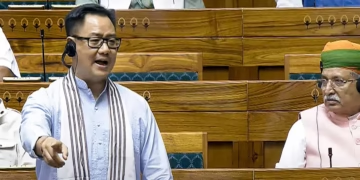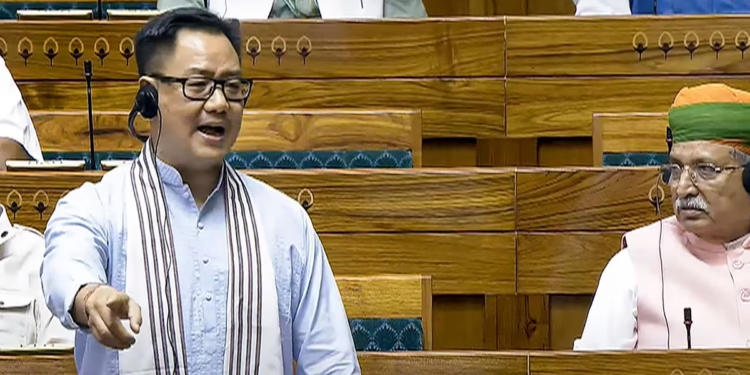The long-awaited eight-hour debate on the Waqf Amendment Bill commenced on Wednesday with Minority Affairs Minister Kiren Rijiju launching a strong critique of the Congress party. The BJP has accused the opposition party of “minority appeasement,” and Rijiju claimed the Congress, which has staunchly opposed the bill, would have given the old Parliament building to the Waqf councils.
The debate began with a point of order raised by opposition MP NK Ramachandran of the Revolutionary Socialist Party (RSP), who questioned the authority of the joint parliamentary committee (JPC) tasked with reviewing the Waqf Amendment Bill. Ramachandran argued that the committee had no explicit mandate from the House to introduce changes to the bill.
Rijiju, in his attack on the Congress, alleged that the UPA (United Progressive Alliance) government, which was in power before the current BJP administration, had made “questionable changes” to the Waqf laws. He accused the UPA of denotifying 123 prominent buildings and transferring them to the Waqf, a body responsible for the administration of Muslim religious and charitable trusts.
The opposition’s objections were raised just before Rijiju’s address, with Congress leader KC Venugopal questioning the limited time provided for the opposition to review the modified draft of the bill. Ramachandran, interpreting parliamentary rules, contended that the committee had overstepped its authority by making changes to the bill without proper authorization from the House.
The changes, made by MPs from the ruling BJP and its allies, were approved by the Union Cabinet in February. Home Minister Amit Shah, responding briefly, defended the JPC’s role, saying it had merely made suggestions that were later incorporated into the bill by the government, not by the committee itself. Shah also took the opportunity to criticize Congress, calling the committee formed under the UPA a “rubber stamp” body and contrasting it with the BJP-led committee’s more consultative approach.
Despite the commotion, Speaker Om Birla ruled in favor of the government, allowing Rijiju to present the amended bill. The Waqf Amendment Bill, first introduced in the Lok Sabha in August last year, had sparked strong protests from the opposition, which described the proposed changes as “draconian.” The bill was then sent to the committee, which filed its report in February, with opposition MPs claiming their suggestions were ignored.
However, BJP members rejected those claims, with panel member and Lok Sabha MP Aparajita Sarangi asserting that the committee, led by BJP’s Jagadambika Pal, had made efforts to listen to everyone and provided ample time for amendments.
The JPC conducted nearly 30 hearings over six months, but these were often marked by disorder, with one meeting turning violent after Trinamool Congress MP Kalyan Banerjee smashed a glass bottle on the table, accusing BJP MP Abhijit Gangopadhyay of provocation. After extensive deliberation, 66 changes were proposed, of which 44 came from the opposition and were all rejected. The remaining 23 suggestions from BJP and allied parties were accepted, and after a vote, 14 were cleared.
A contentious issue during the deliberations was the removal of dissent notes from opposition MPs, which led to further controversy. While the Chair had discretion over this matter, the government later agreed to include the dissent notes following negotiations.
The joint parliamentary committee, which had 16 members from the BJP and allied parties and 10 from the opposition, proposed 44 changes to the original draft of the Waqf Amendment Bill. These changes included provisions for nominating non-Muslim and women members to Waqf boards, as well as appointing a Union Minister, three MPs, and individuals of ‘national repute.’ The bill also proposed to limit donations from Muslims who had been practicing their faith for at least five years.
The debate and discussions around the Waqf Amendment Bill continue to stir political divisions, with both sides offering sharp critiques of the other’s stance.
Also Read: Faith and Unity: Over 300,000 Devotees Gather at Mumbai’s Haji Ali Dargah on Second Day of Eid 2025















 Categories
Categories









